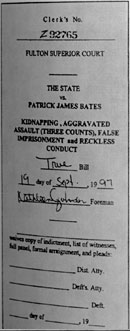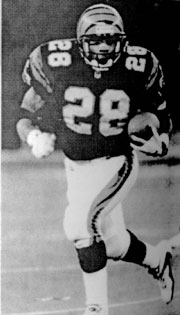Pros and Cons (39 page)
Authors: Jeff Benedict,Don Yaeger

The league’s new policy, scheduled to go into effect in July 1998, will finally begin treating all criminal convictions just as they do violations of the league’s drug policy. NFL players convicted after the policy’s effective date could face game suspensions, fines, or both. The policy will not affect teams’ ability to draft and employ players whose criminal pasts are as long as their broad jump—as long as the arrests and convictions occur before joining the league.
While the policy is an obvious step forward, but it is several years and hundreds of victims too late.
Tagliabue’s decision was a dramatic departure from the previous position the commissioner’s office has taken—”There’s no rule that says if you’ve been charged in a crime you can’t play in the NFL,” league spokesman Greg Aiello said after Seahawks wide receiver Brian Blades was arrested in 1995 for the shooting death of his cousin Charles Blades. “We’re not a law enforcement agency so when we go beyond what society has done to punish a person, that opens legal questions.”
Tagliabue knows that while a hard-line stance on crime makes for good press—his announcement made page one of
USA Today,
after all—this is also an economic issue for the NFL. Ample evidence exists that free agency, constantly relocating franchises, astronomical player salaries and corresponding television contracts have distanced the relationship hard-core fans have with their teams and their heroes. If the commissioner doesn’t draw a line— any line—on unacceptable behavior off the field, fans will continue to lose their connection. “A lack of respect for the law by highly paid athletes is a sore point with the fans,” Harold Henderson, the NFL’s executive vice president for labor relations, acknowledged after Tagliabue’s announcement.
Opinions vary on where the commissioner’s new policy should draw the line—should conviction for certain felonies trigger harsher penalties than convictions for others—but in interviews for this book, the authors found near unanimity in the belief that there needs to be a line of some kind. The following is a sampling of some of the views expressed to the authors:
“It would be nice to see the league—the NFL,—work with the NFL Players Association and enact a zero tolerance policy for any sort of drug and alcohol abuse, and serious criminal offenses,” Hall of Fame receiver Steve Largent, now a U.S. congressman, said. “Though I recognize zero tolerance would be impossible, I don’t think it would be unfair at all. I think in terms of life and the ability to be forgiven by God and by your fellow man, I think there’s unlimited opportunities for that to happen. But in terms of a person’s opportunity to stay in the league and continually give the league and the game and the team or franchise a bad name and a black eye, I think there should be a limited number.”
“A lot of contracts today have character clauses in them,” added thirteen-year veteran Rich Caster, who retired from the NFL after winning the 1983 Super Bowl with the Washington Red-skins. “I’d like to make them enforceable and let’s make our expectations clear. They will have to sacrifice some people along the lines somewhere to actually make it clear. It’s a shame it has to go that way, but that’s a sacrifice that has to be made for the good of the league. Somewhere along the line they have to pick out some guy who has stepped out of the line one, two, three, four times too many and then step on him and say that’s it and ban him, and I think with that people’s jaws are going to drop for a minute, but I think they will soon get over it because I think the game will be better and better for it.”
“There is always room for discretion because there are facts and circumstances,” pointed out William Bennett. “But people who commit serious felonies should not be playing on professional sports teams. Period. They should not be there. I don’t think that is a hard one. You can’t go around beating up people, busting into places, kidnapping people, or raping women.”
W
hat, in the opinion of the authors, should the policy read like? Bright-line rules are hard to come by, but here are two:
1. Any player whose pre-NFL criminal history details a pattern of
arrests
for serious crimes should not be draft-eligible. Convictions aside, when an individual has demonstrated a pattern of run-ins with the law related to violence or drugs, he should not be permitted to earn hundreds of thousands of dollars, carry the mantle of a role model, and have license to further disregard the law.
Examples of players in the book who would fall under this category include Corey Dillon, Ryan Tucker, Christian Peter, Charles Jordan, and Wayne Simmons.
2. Any player convicted of a “serious” crime (as defined in Chapter 1) involving violence or drugs
after
joining the NFL should be banned indefinitely.
Examples of players from the book who fall under this category include Lamar Thomas, Tim Barnett, Patrick Bates, and Cornelius Bennett.
While those two situations are straightforward, there clearly are many cases which call for discretion. The focus in such situations requires a sincere look beyond the singular incident in question in order to eliminate the gray areas. For those situations, the greater the extent of the prior record, the more likely the league should lean toward sanctions.
The answer can’t be found in numbers. One DUI or two disorderly conducts can’t be weighed against a rape, a domestic violence conviction, or kidnapping. It comes down to integrity. A pattern. A history of problems. The player who has been arrested seven times—even if never convicted—should not be playing. The player with no history who gets arrested—and perhaps convicted one time—deserves a second chance after substantive punishment.
Even NFL Players Association chief Gene Upshaw agrees that the commissioner must draw a line and stick to it. “We feel that as long as what is suggested protects the due process rights of players, that some kind of message would be a good thing,” Upshaw said. “There are hundreds of players who are not criminals. They don’t like being painted with the same brush.”
T
hey want it to be a family game, but if you’re going to employ criminals to get it done, I think it sends just a terrible message about your interest in the family,” Rich Caster, now vice president of community relations for Bovis Construction Corporation, said. “It sends a terrible message to the guys back in college, the guys coming through high school, that it doesn’t matter that you have a clean rap sheet, or that you stay out of trouble.”
Caster, once the New York Jets’ selection for participation in the NFL’s feel-good United Way campaign, has one last concern: “If the league doesn’t do something,” he said, “they’re going to run out of guys to do those United Way commercials. There won’t be enough good guys left.”
So now the stage is set. Opinion rests solidly in the corner of increased discipline. The commissioner now has a policy on which to lean. The research in this book lays bare the extent of the NFL’s problem.
If the NFL wants more pros and fewer cons on the field, the commissioner can—and should—make it happen.

Ryan Tucker was drafted by the St. Louis Rams while charges were pending against him for assault with a deadly weapon capable of causing death or serious bodily injury. (Tarrant County, Texas, Corrections Center photo)

Patrick Bates, the Atlanta Falcons defensive back who was cut from the team in 1997 one week after authorities charged him with brutally assaulting his girlfriend and endangering a child. (Photo courtesy of the Atlanta Falcons)

A copy of the indictment returned by a grand jury against Patrick Bates in September of 1997. On March 23, 1998, Patrick Bates pleaded guilty to a felony charge of criminal damage to property and second degree battery. Just over a month later, he signed a contract with the Oakland Raiders. (Fulton County, Georgia, Superior Court)

Cornelius Bennett, the Atlanta Falcons All-Pro linebacker who was charged by New York authorities with rape, sodomy, sexual abuse, and false imprisonment in May of 1997. (Photo courtesy of the Atlanta Falcons)

Cornelius Bennett, flanked by defense attorney James M. Shaw, entering a Buffalo, New York, courtroom. He was sentenced to serve 60 days in jail after pleading guilty to a reduced charge of sexual misconduct.
(Buffalo News)

